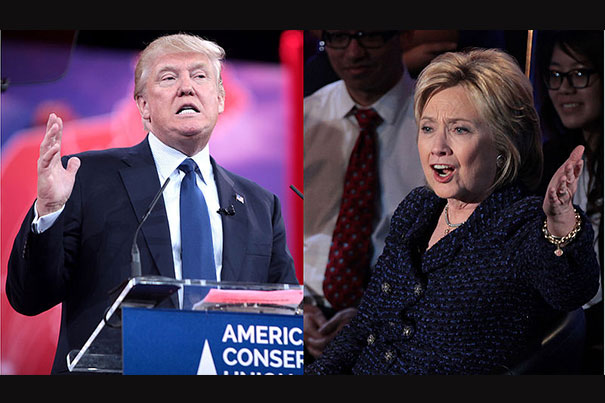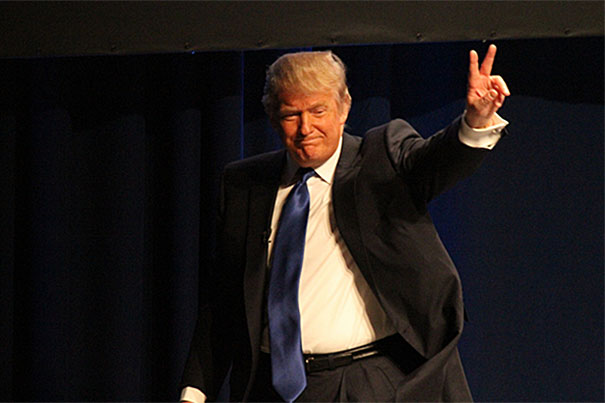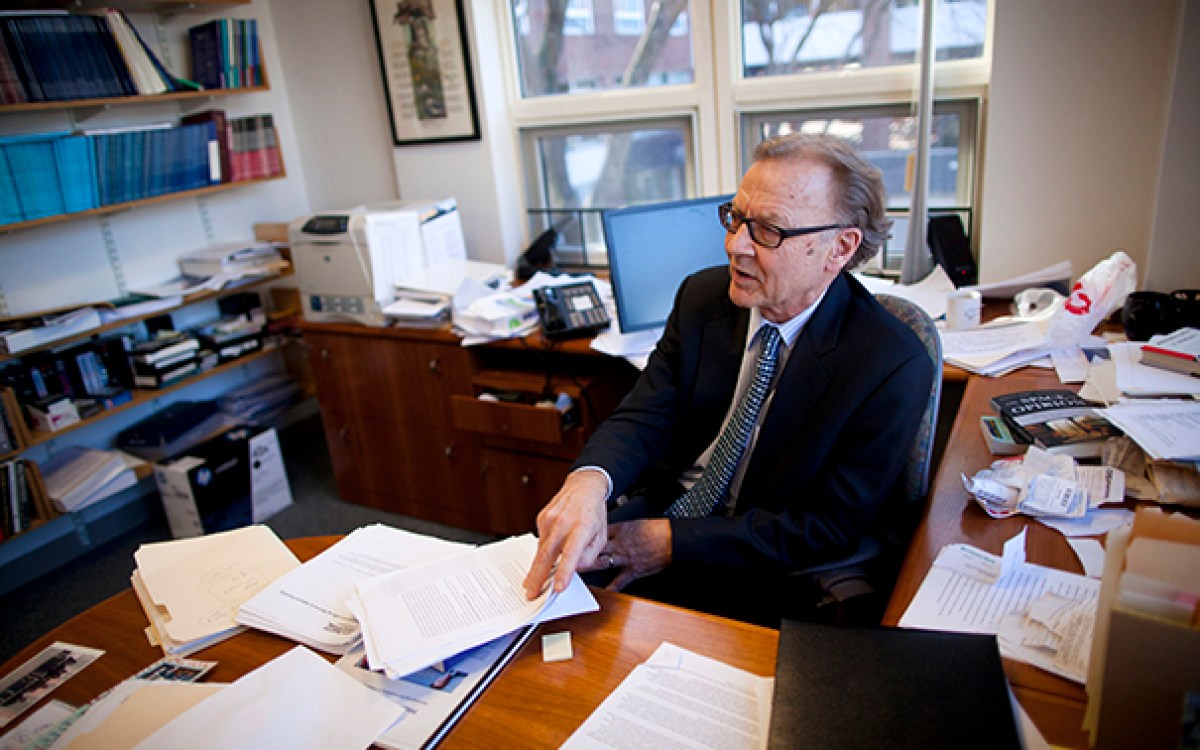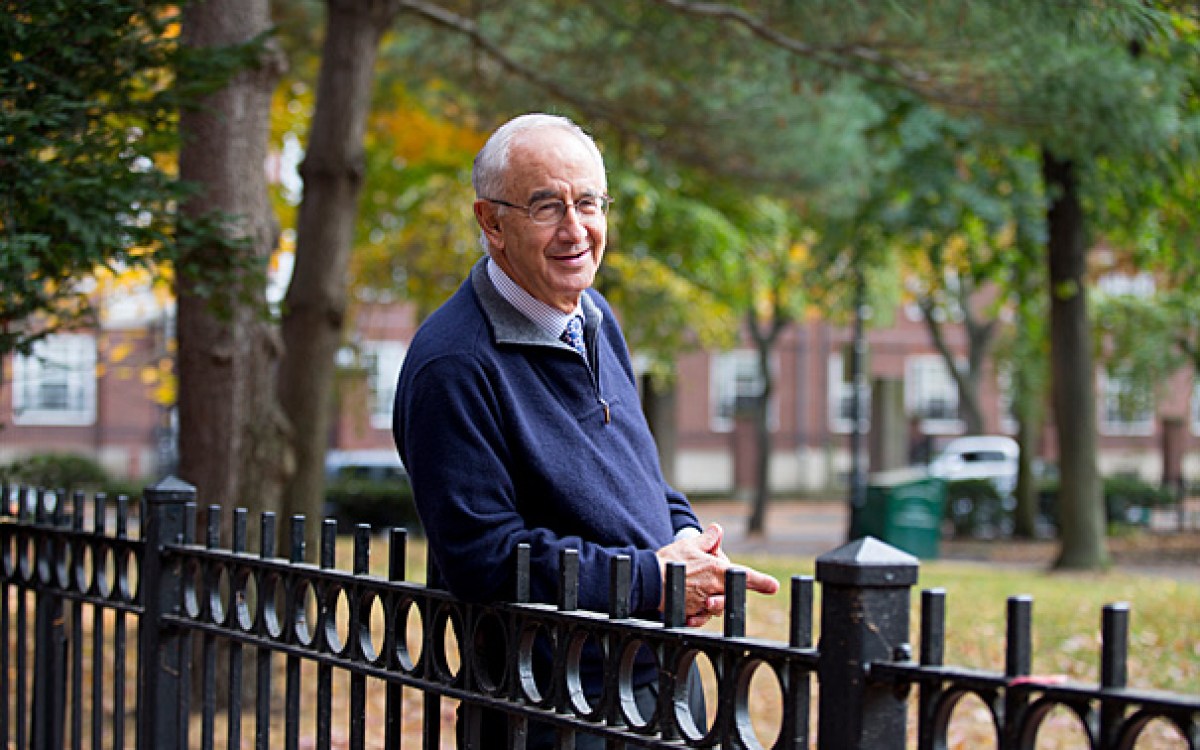
After 57 presidential elections since 1789, has something fundamentally changed? Harvard analysts weigh in on the 2016 election.
Courtesy of Wikimedia Commons
Politics in a ‘post-truth’ age
In this topsy-turvy presidential campaign, the old laws may no longer apply
Politics has always been a nasty and brutish game, but what has startled political observers about the 2016 election is how long-established standards and rules once thought to govern the way we choose a president have seemingly fallen away.
Conventional wisdom appears up for grabs about who’s qualified to run, who’s likelier to win, how candidates conduct themselves, how campaigns are run, how the media remains fair, and what ideas and actions voters will embrace or reject. The unpredictable race is now down to the unorthodox but successful candidacy of Donald Trump, the brash celebrity business mogul, and Hillary Clinton, the familiar careerist politician who’s been eyeing the presidency since at least 2007. This has been an election in which no political experts have had a handle on what will happen next.
Do these surprising dynamics and developments suggest that this nation is simply in a strange, outlier election cycle, or has it somehow crossed a political Rubicon? After 57 presidential elections since 1789, has something fundamentally changed?
“I look at this as a normal revolt in the cycle of revolt and collapse that is the history of America and the way it manages change. We’ve avoided the violence of European revolutions quite extraordinarily because we’re in fact a more institutionally and culturally conservative country than we’d like to think we are,” said Richard Parker, a lecturer in public policy at Harvard Kennedy School (HKS) and senior fellow at the Shorenstein Center on Media, Politics and Public Policy.
“We have a story of our being independent and independent-minded and ‘Don’t tread on me,’ and that’s why the Tea Party is the image of this latest eruption. And yet at the same time, we’ve got one of the most conservative governing constitutions in the world. We’ve got all the constraints of a two-party system and its comparative lack of representativeness compared to a multiparty parliamentary system. We’ve got information distribution concentrated in a relatively small number of hands. Wealth is as concentrated as it’s been at any point in 100 years. So it doesn’t feel to me like a country that: A., is falling apart, or B., is all that prone” to making huge structural changes, he said.
‘The ability of democracies to function is not reflected simply in whether or not there are quadrennial elections that are carried out fairly, but whether there’s a culture of democracy that constitutes rules of the game for most people and that are felt not just as rules, but as values.’ — Richard Parker
“I don’t think it’s new. If you look at political campaigns in the 19th century, there’s [some] pretty vicious rhetoric,” added Jennifer Hochschild, the H.L. Jayne Professor of Government at Harvard. “The media were very, very, very partisan through much of the 18th and 19th centuries. The notion of the nonpartisan, fair, and balanced media is really a kind of mid-20th century phenomenon.
More like this
“I’m not prepared to say that we are in uncharted waters,” although “it’s hard to think of a presidential candidate — we’ve certainly had demagogues and racist demagogues — I don’t think any presidential candidate of the two major parties looks like” Trump, she said, noting parallels between his surprising success and that of first-term U.S. Sen. Barack Obama, an outsider who rode an emotional wave of change into office seven years ago.
Yet analysts say this election does raise important questions about what it means to be Americans in a democracy today.
“For me, one of the principal underlying questions has to do with who we are as an American society in a pluralistic world,” said Harvey Cox, Harvard’s Hollis Research Professor of Divinity. The proliferation of partisan media that has driven rising political polarization is worrisome because such outlets reinforce biases and squelch our ability to empathize as we talk past one another, he said. “We’re not learning how to negotiate our differences at a very basic, grassroots level, and I think losing the capacity to do it at a national level.”
“The ability of democracies to function,” said Parker, “is not reflected simply in whether or not there are quadrennial elections that are carried out fairly, but whether there’s a culture of democracy that constitutes rules of the game for most people and that are felt not just as rules, but as values.
“I think that the great moral questions for me are, first of all, whether or not we can recover a sense of being a moral community that functions as a democracy. That’s the most pressing. And then you move on to the writ policy questions and the issue of what it means for America to be a global leader or a global hegemon and what it’s going to mean going forward,” compared with what it’s meant in the 60 years since World War II.
“There’s no clear sense in which America can point, as it did in the Rooseveltian period, toward a set of rights or an organization of societies and international rules that are clear victories for this idea of moral democracy,” he said.
A diverse, democratic populace like that of the United States will never reach total unanimity on an issue, said political theorist Danielle Allen, who directs the Edmond J. Safra Center for Ethics. But “you do have to have shared principles. Fundamentally, you have to have a commitment to democratic lawfulness and to constitutionalism and basic rights. And Trump is challenging that in a way that other candidates are not.”
Lies, damn lies, and politics
Presidential elections are the ultimate popularity contest. Whoever persuades the most people in enough states to provide 270 electoral votes is the winner. And yet, after the Democratic and Republican primaries winnowed a field of 23 contenders, the 2016 electorate will have to choose between Trump and Clinton, two of the least-liked major candidates ever to run for president. In May, according to a Gallup poll, two-thirds of Americans said that neither Clinton nor Trump is honest and trustworthy, and both have unfavorable numbers at historic highs.
How can this be? Certainly, the dissembling politician who skillfully shades the truth, gives the issues a self-serving spin, or sidetracks inconvenient facts is a timeworn archetype in American politics. But outright lying or routinely withholding information that may cast an unflattering light on a candidate or campaign has become a central, unifying theme this year. Both Trump and Clinton are trying to brand the other as a habitual liar who can’t be trusted to run the country or look out for the interests of ordinary citizens. In previous elections, such assertions, if proven false, likely would have damaged the candidate who made them. That’s far less true in this election.
The fact-checking nonpartisan organization Politifact recently rated 129 of 169 statements made by Trump as “mostly false,” “false,” or “pants on fire.” It found that of 212 statements made by Clinton, whose assertions about her use of a private email server while secretary of state have been undermined repeatedly, 59 were similarly untrue.
So how did we end up with these presumptive party nominees? Has the United States entered some sort of “post-factual” political period? Critics of the United Kingdom’s recent vote to exit the European Union suggested that the result was at least partly caused by misleading ads and editorializing by the “Leave” campaign, and that some voters either didn’t know the assertions were inaccurate or, worse, didn’t care.
“This has just been a clinic on the post-truth age of politics, Trump in particular. It’s performance art at this point,” said Christopher Robichaud, a lecturer in ethics and public policy at HKS. “It’s true that what Trump is saying is false, it’s just that in the post-truth age of politics, we’re beyond criticizing someone for that. It’s like criticizing an actor for saying a lot of false things. He says whatever he needs to say to move people emotionally.”
‘We’re in the very unlucky situation that the first person who happens to have mastered the new communications architecture is also filling those channels with junk.’ — Danielle Allen
Hochschild, co-author of “Do Facts Matter?,” a book on truth and democracy, disagrees. “I think that’s a little too strong. It is certainly the case that to some degree people have different truths. We listen to different media, we either see different events or prioritize different events differently or interpret the same event differently. There’s a lot of that going on, there’s no question.
“Whether he’s crossed some line that had, to some degree, restrained previous politicians and it turns out it wasn’t a real line anyway and they all are kind of fools for having thought that facts actually matter — I think you could make a case for that,” she said.
“I still would like to believe that it’s going to catch up with him, that once we get [further] away from the primary season, it’s not going to work…,” she said. “But I wouldn’t put money on that at this point.”
Rules of the game
Much of what’s astounded the professional political class is the extent to which the seemingly immutable rules about how elections are won and lost no longer appear valid. Most evident is the way in which U.S. Sen. Bernie Sanders, a white-haired, little-known Socialist from Vermont, managed to draw stadium-sized crowds and raised more money than every Republican and Democrat except Clinton. Then there is the way that the novice Trump built a national political following using Twitter and pep rallies while eschewing major fundraising, polling, data analytics, and ground campaigning.
“The communications marketplace has been transformed, and Trump is the only candidate in either party who understands the new architecture,” said Allen. “Any candidate could actually master the communications architecture just as well as Trump has and fill it with positive content. We’re in the very unlucky situation that the first person who happens to have mastered the new communications architecture is also filling those channels with junk.
“For starters, we have to acknowledge that the culture has bifurcated between a culture that reads and a culture that watches. Trump’s is the only campaign that’s built around that principle. Most of his campaigning is directed at people who watch and don’t read, which is partly why he can ignore the text press. If you look at his campaign website, he doesn’t have policy papers, he has short videos expressing more or less his attitude on particular things. The old-fashioned read-a-lecture-from-a-text does not meet audiences where they are right now. And Trump gets that,” said Allen.
More like this
“Second, he gets the bifurcation of the audience, and he’s using that very much to his advantage. And then there’s the social media piece. He knows how to amplify conversations in a way that’s well beyond the capacity of the other candidates.”
Everyone’s a whiner
Not that long ago, elections were hard-fought because they were decisive. Someone won and someone lost. In 2000, the U.S. Supreme Court intervened in an extremely tight race between Texas Gov. George W. Bush and Vice President Al Gore to deliver the presidency to Bush through electoral votes despite Gore garnering more votes nationwide. Gore’s concession speech was a gracious acknowledgment of the court’s decision and a pledge of cooperation despite an outcome that many voters felt was fraudulent.
Now, our politics appears to put a lie to the late U.S. Sen. Daniel Patrick Moynihan’s famous line that “Everyone is entitled to his own opinion, but not to his own facts,” while embracing a culture of whining. A contest that does not yield someone’s desired result is often not a loss now, but “rigged” or “unfair” and therefore illegitimate. The untrue assertion promoted for years by Trump and others that Obama was twice elected president of the United States under false pretenses — that he is not an American-born citizen as the Constitution requires and thus not entitled to the powers of the office — is at the heart of “Birtherism.”
“I’m always sensitive to challenges of a public official’s legitimacy because that’s a moral claim. It’s not ‘You’re wrong,’ or ‘I think you’re bad for the country,’ or ‘I’m going to oppose your ideas.’ It’s ‘You don’t belong,’” said Robichaud, also noting the grumblings from the Sanders camp and his supporters that Clinton’s pending party nomination will be the result of an unfair selection process manipulated by the Democratic National Committee.
“I think in an election year in which anti-establishment sentiments run high, you’re going to see an increased use of language about the lack of legitimacy, and up to a point it’s fine — all’s fair in love, war, and politics. But I do think at some point it crosses a line. I don’t think it’s healthy for our democracy to claim there are no legitimate political mechanisms,” he said. “It’s just not true.”
Certainly, the primaries process is “ugly and messy” and “the way we vote for a president in this country is deeply problematic. These are real problems we need to and should look at and address … But I’m not ready, nor do I think it’s reasonable, to look at them and go ‘nothing legitimate can come out of this process.’”
Defining deviancy down
Just four years ago, the line between what was fit for public discourse and what was best left for private conversation was pretty clear. Candidates vying for the presidency strove to project a statesmanlike demeanor before voters at all times, talking about topics and issues that played to their perceived strengths in tone and language that reinforced those goals. Few thought it strategically sound to provide ammunition to enemies by speaking intemperately or risking off-color or self-destructive comments like Mitt Romney’s infamous “47 percent” remarks.
Yet, since the Republican primary began last summer, Trump has blazed his trail through cursing, name-calling, making sexual innuendos, advancing conspiracy theories, and making tabloid-style smears about opponents’ alleged criminal behavior, and disparaging and mocking people for their ethnicity, gender, appearance, disability, and religious beliefs. His comments have rarely hurt him badly and have belied the conventional wisdom about what 21st-century voters will tolerate. Some Trump opponents, including U.S. Sens. Marco Rubio and Elizabeth Warren, also have also dipped their toes into brackish water with mixed results.
Allen, who teaches a course on justice and citizenship in ancient Athens, the birthplace of democracy, said the tone of the race in 2016 is “demonstrably different” from past elections. The Athenians “were incredibly scurrilous and said all kinds of things about each other’s mothers and so forth,” but “they never stooped to the level of vulgarity we’ve seen this year.”
The coarsening of our political language is an “unsurprising” carryover of our shifting tastes and standards of popular culture over the last few decades, which paved the way for acquiescence to what once was shocking or even deadly for a political career, she said. Throw in the post-Internet culture of casualization, where billionaire CEOs wear sweatshirts to board meetings, where cyber-bullying is unfettered, and where everyone feels free to offer unsolicited opinions on everything from politics to poor restaurant service across global publishing platforms, and it’s not hard to see the decline.
‘Trump is tapping into part of our culture that doesn’t want to be told that the way that they conceptualize and speak about the world is problematic at all — and they really ought to reconsider that.’ — Christopher Robichaud
The Continental Divide
History often provides clues to the present, however. Analysts say this election’s populist themes of division and suspicion are straight from the frayed pages of the American political playbook.
“Before the Civil War, people referred to the United States in the plural. It’s only after Northern triumphalism takes hold of the country that we begin to actually speak of the United States in a unitary way,” said Parker. “We are in many ways a deeply disunited country and have been all along. To our great advantage in some ways, we have downplayed, ignored, or lied to ourselves about the degrees of disunity, but they are there.
“Race, region, and religion are the great axial forces or vectors of American politics. So to know where someone is going to stand, you need to know race and religious background and gender, but you also need to know something about region, because region becomes a proxy for very powerful communal attitudes that play out in individual ethics even though the overlay of law may make the region look not substantially different from other parts of the country,” he said.
“Our culture has had the beliefs that Trump has given voice to for quite some time — a portion of the culture anyway. I don’t think it’s purely a result of Trump being Trump. I think it’s the times as well,” said Robichaud. “There’s a lot of anxiety out there that has made it ‘permissible’ to say these things again [because] we’re in crisis mode. Trump is tapping into part of our culture that doesn’t want to be told that the way that they conceptualize and speak about the world is problematic at all — and they really ought to reconsider that.”
In a culture founded on the pursuit of religious freedom, stoking fears of terrorism by blaming Muslims is the dark side of what has been an extended period of religious tolerance since the anti-Semitism and anti-Catholicism of 1950s politics, said Cox.

“There’s more mutuality and mutual respect and cooperation among religious groups in this country than there has been for a very, very long time,” he said. “It’s enormously improved on the one side. On the other side, it’s been exacerbated by people who want to stimulate this sleeping, underlying, dormant animosity and use it for their own purposes.”
Does the resonance of naked appeals to racial, religious, ethnic, and gender prejudices indicate a sudden reversal of what’s acceptable?
“It’s important to say that the norms are still obvious and in existence. The trouble is that they seem to have lost their power. It’s not that they’re gone; we see a good number of the candidates adhering to the norms of civility and reasoned argumentation,” said Allen, a frequent Trump critic. “The majority of Americans do not approve of what Trump’s doing, and we’re all sort of losing sight of that fact.
“We have a kind of collective-action problem: How do you re-establish norms of decency and civility so that they do capture … to some extent the whole of the culture?”
Allen likens it to the advent of “quiet cars” on trains. “Everybody’s annoyed” if there’s still noise, “but nobody wants to say anything; nobody wants to be the one to stand up and say, ‘Hey, would you turn your music down?’ So you have a collective-action problem, which is actually that the majority of opinion is against this kind of behavior, but the majority doesn’t know how to coordinate around re-establishing those norms,” she said.
Where we go from here
Would a Trump victory in November open the door to other celebrities and public figures outside politics to run for president?
Parker said Trump’s decades of television celebrity coupled with his personal wealth and his unusual skill at garnering billions in free media exposure make him an anomaly. “I don’t think this sets a precedent. It’s more likely we’re going to see more women elected president than we’re going to see billionaire TV stars elected president over the next 40 years.
“I’m struck by the fact that the passions are so high relative to the policy stakes, which are so low. There’s nobody advocating we overthrow the government by force and violence, there’s no marshaling of nighttime rallies with giant bonfires and the burning of the books of the opposition. I don’t think we’re going there,” he added.
“I actually think that we’re in another one of those long period interregnums, just as we were in the 1920s or the 1970s. This is not going to be a determinative election, but that rather 2020 or 2024 is going to produce a major new president who’s then going to lock in an ideological direction for the country that’s probably going to last for 30 or 40 years. And it’s going to be driven in no small part by this massive demographic shift that’s going on,” said Parker.
“If this continues for a couple of generations, we’re really in trouble. The good news is I don’t see why we should think it will,” said Robichaud. “I’m hoping this is just a moment for us to go through, collect ourselves, and hopefully move forth. I don’t know where the bottom is, but I’m really hoping Trump represents the bottom and we can start pulling ourselves up from that and recognizing that not everything goes.”
Added Hochshild: “I cling to the belief that sooner or later, the chickens come home to roost.”






